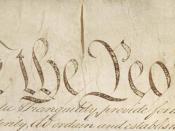Whether a passport can be revoked or not has been a major question since the mid- 1800's. Haig v. Agee is a landmark Supreme Court case charging that the Secretary of State can not revoke a passport on the grounds that the power has never been granted by the Congress to the Secretary, and that revoking a passport violates the first and fifth amendments of the Constitution of the United States. Not only does the Secretary of State have implied powers, but revoking Agee's passport did not violate any laws or rights.
In Haig v. Agee, the defendant claims that the Passport Act of 1926 does not grant the Secretary of State the right to revoke passports. However, the Passport Act does state that the Secretary of State is the only person who can grant and withhold passport applications. And based upon later provisions, the Secretary can withhold applications if the party is involved with illegal activities.
If the Secretary of State can grant and withhold passports, was it implied by the Congress that the Secretary has the powers to revoke passports?
'The Secretary of State may grant and issue passports, and cause passports to be granted, issued, and verified in foreign countries by diplomatic representatives of the United States . . . under such rules as the President shall designated and prescribe for and on behalf of the United States, and no other person shall grant, issue, or verify such passports.' 22 U.S.C. 211a (1976 ed., Supp. IV).
Since the Congress did not specify who has the powers to revoke passports, it should be assumed that because the Secretary is the only person who can grant passports, they are the only ones who can revoke passports on grounds of illegal activities, such as treason. If you consider that...


